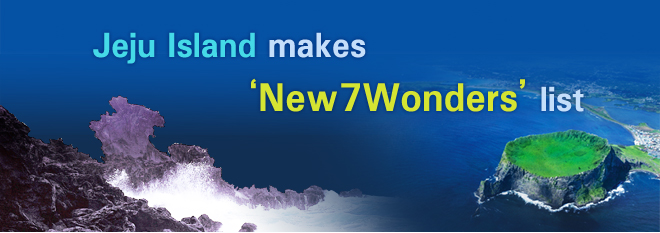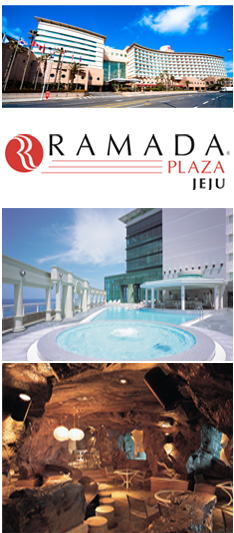|
|
 |
 Home > Venue > Venue Information |
| ABOUT JEJU |
The Jeju Island is famous for 3 things: roaring winds, magnificent rocks, and woman divers for fishing. As one of the host cities of the 2002 Korea/Japan FIFA World Cup, Jeju's Seogwipo City has a fame of the most enchanting environment in Korea. Jeju is a focal point of international affairs and offers many kinds of recreation together with breathtaking vistas, a temperate climate and a unique traditional culture. Located in the center of this volcanically formed island is Mt. Halla (a dormant volcano), which is filled with over 1,800 species of wild plants, wild deers, and an ecosystem, that will surely amaze all visitors.
Jeju also offers unbelievably breathtaking views from coast to coast, ranging from waterfalls at Haean Jidae to naturally sculpted cliffs at Jusang Jeolli. Tourists can enjoy each season in Jeju with a particular splash of color; brilliant yellow-colored flowers in spring that spread across the landscape, the golden beaches and sea vistas in summer, the Eulalia's light brown wispy reeds flowing in autumn winds, and the lovely snow flowers of Mt. Halla in winter are all must-sees of Jeju. |
| • Located |
: in close proximity to major cities of Korea, China, and Japan at a central location in Northeast Asia |
| • Population |
: 562,000 |
| • Area |
: 1,848Km2 |
| • Visa |
| : |
 |
Entry allowed for visitors from 180 countries up to 30 days |
|
|
 |
Jeju Island has been named as one of the new seven natural wonders of the world on Saturday, 300 days after the nation launched an online voting campaign.
Jeju Island was one of the final 28 global candidates for “New7Wonders of Nature,” led by Swiss non-profit New7Wonders Foundation.
The foundation said the six other provisional winners were Brazil’s Amazon River and Rainforest, Vietnam’s Halong Bay,
Argentina’s Iguazu Falls, Indonesia’s Komodo National Park, the
| Puerto Princesa Underground River in the Philippines and South Africa’s Table Mountain. |
 |
|
|
| EXCITING ACTIVITIES AND FOODS |
You can enjoy hiking, bike riding, paragliding, scuba diving, windsurfing, hunting, horseback riding, swimming in the ocean, and sightseeing boat trips in Jeju. Jeju has a wide variety of local fruits and foods, such as delicious Jeju tangerines, saltwater fish (Okdom) stews, grilled saltwater fishes with seasoning, rice porridges with abalone, pheasant dishes and hair-tail fish soups. Jeju is more than simply a tourist destination; it is an island full of wonder.
Jeju keeps changing itself into an International Free City, and becomes an island of harmony under the wave of technology while maintaining its ecological treasures.
Further detailed information is available at the website of http://welcome.jeju.go.kr. |
 |
|
 |
Jeju World Natural Heritage |
| Mt. Hallasan |
 |
Mt. Hallasan is the central peak of Jeju Island, a shelfal shield volcano constructed on the continental shelf of the Yellow Sea. Rising 1950 m above sea level, Mt. Hallasan is the highest peak in South Korea and is the symbol of Jeju Island. Mt. Hallasan boasts peculiar volcanic landscape, produced by the crater lake Baeknokdam at the summit, the precipitous rocky cliffs of the Yeongsilgiam, and about forty volcanic cones. Mt. Hallasan was designated as a natural monument and a national park in 1966 and in 1970, respectively. It was also designated as a UNESCO Biosphere Reserve in 2002 and is carefully protected from human activity. |
|
| Seongsan Ilchulbong Tuff Cone |
 |
Seongsan Ilchulbong, also called unrise Peak is an archetypal tuff cone formed by hydrovolcanic eruptions upon a shallow seabed about 5 thousand years ago. The 182 m-high tuff cone, dominating the eastern seaboard of Jeju Island like a gigantic ancient castle, not only preserves its bowl-like crater but also provides excellent sea-cliff exposures of diverse internal structures. These features have great geologic values in that they provide a basis for interpreting eruptive and depositional processes of hydromagmatic volcanoes worldwide in addition to the past volcanic activity of the tuff cone. |
|
| Geomunoreum Lava Tube System |
 |
Geomunoreum is a cinder cone located east of Hamdeok Elementary School, Jeju City, Jeju Self-Governing Province (oreum is a word in the Jeju dialect for a tuff cone). It covers the area from Seonheul-ri of Jocheon-eup to Songdang-ri of Gujwa-eup. A crater is present near the summit of the cinder cone and small peaks are within the crater. Overall, the cinder cone shows a horse-shoe shape, due to the break-through of the lava flows toward northeast direction. A cinder cone is one type of volcanic cone and it is composed of volcaniclastic sediments produced during volcanic eruptions. The shape of the cinder cone was originally spherical, however therrmal erosion of lava flows resulted in a horse-shoe shape. A long valley was developed near the entrance of the open part of horse-shoe. Pine trees, Japanese cedars, and Oriental arbor vitaes are growing over the cinder cone, making a dense forest.Because Geomunoreum shows the evolutionary stages of cinder cones and has geological significance, the cinder cone was designated as a national monument in January of 2005. |
|
 |
The Ramada Plaza Jeju Hotel was established on July 1, 2003, with a 100% investment by the Korea Teachers Credit Union. This internationally renowned deluxe resort-style business hotel was opened to raise management and its accommodation facilities to world class standards, and thus satisfy worldwide business travellers and tourists.
Modeled after a deluxe cruise ship in Northern Europe, this floating hotel is located within five minutes' ride from both Jeju harbor and Jeju International Airport. It can be reached within an hour wherever you are on the Jeju Island. Visitors from home and abroad can experience the essence of Jeju culture enjoying the nearby spectacles of Chilsung-Ro street, Tap-dong outdoor performance hall, Sanjicheon, Yongduam, and Yongyeon bridge especially during the night time.
Ramada is the first floating hotel in Korea, whose guest rooms make its guests have a unique experience of feeling as if they were on the sea. Each room boasts off its characteristics with high quality interior design. Various types of 380 guest rooms which command a magnificent view of mountains and the sea are in place awaiting their guests. Besides, attached facilities such as the convention center which can accommodate up to 1200 people, small and medium-sized seminar rooms, health club, indoor and outdoor swimming pools, and hot spa, etc. guarantee successful business transactions and comfortable amenities to its guests.
|
 |
| From Jeju International Airport |
- Turn left at Imhang-Ro
 Drive toward Yongdooam / Tapdong (distance: 2.2km / taxi fare approx. 2,500 won/ 6 minutes' ride) Drive toward Yongdooam / Tapdong (distance: 2.2km / taxi fare approx. 2,500 won/ 6 minutes' ride)
|
| From Jeju Port |
- Turn left at Imhang-Ro
 Drive toward Yongdooam / Tapdong (distance: 2.2km / taxi fare approx. 2,500 won/ 6 minutes' ride) Drive toward Yongdooam / Tapdong (distance: 2.2km / taxi fare approx. 2,500 won/ 6 minutes' ride)
|
|
 |
Hotel Information |
|
|
 |
|
|